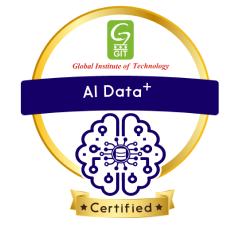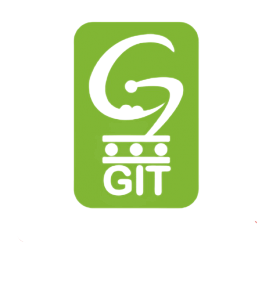
AI Data Analytics and Knowledge Mining
Are you ready to embark on a transformative journey into the world of Artificial Intelligence (AI)?
NEXT STARTS
Enrollment is ongoing. Join today—spots are filling fast!
PROGRAM DURATION
80 Hours
LEARNING FORMAT
Online Bootcamp
Course Description
The Global Institute of Technology ‘Data Analytics and Knowledge Mining ‘ is a Certification program designed to prepare learners for entry to mid-level employment opportunities in the field of Artificial Intelligence related Data Analytics and Knowledge Mining. Throughout this program, students will Embark on a comprehensive journey into the world of data analytics and knowledge mining with our course. Gain a solid introduction to these dynamic fields and discover the critical role data plays in decision-making.
Learn how to assess and ensure data quality, a foundational step in the data analytics process. Delve into statistics and data visualization to extract meaningful insights and create compelling visualizations.
Unlock the power of machine learning and AI for data analytics, including supervised and unsupervised learning algorithms. Dive into the realm of text, web, and social media analytics, uncovering valuable insights from diverse data sources.
Explore the challenges and opportunities of big data analytics and harness the potential of knowledge mining and discovery techniques. Plus, master optimization techniques for resource allocation and decision-making.
By the end of this course, you’ll be equipped with the knowledge and skills to extract actionable insights from data, making informed decisions in a data-driven world.
Course Objectives
Upon completing this course on Data Analytics and Knowledge Mining, students will achieve the following objectives:
- Get introduction to Data Analytics and Knowledge Mining
- Understand Data and its Quality
- Explore Statistics and Data Visualization
- Learn Machine Learning and AI for Data Analytics
- Understand Supervised and Unsupervised Learning Algorithms
- Master Text, Web, and Social Media Analytics
- Explore Big Data Analytics
- Learn Knowledge Mining and Discovery
- Deploy Optimization Techniques
By achieving these course objectives, students will gain a comprehensive skill set in data analytics, ranging from data collection and preprocessing to advanced statistical analysis, machine learning, and addressing ethical considerations, ultimately equipping them for careers in data-driven decision-making across various industries.

Prerequisites
Basic understanding of Data Analysis and Familiarity with Data Modeling is a plus
Course Duration
80 Hours (40 Hours Instructor-led live training and 40 Hours Instructor Guided)
Prerequisites
Basic understanding of Data Analysis and Familiarity with Data Modeling is a plus.
Course Duration
80 Hours (40 Hours Instructor-led live training and 40 Hours Instructor Guided)
Course Contents
1. Introduction (2 hour)
- Data, data everywhere. Big Data
- Insights from data. Data analytics process
- Applications and case studies across industries and agencies
2. Data and its quality (4 hours)
- Types of data: Structured vs. Unstructured
- Data sources: Databases, Web, IoT devices and software
- Data quality, cleaning, and preprocessing. Data governance
3. Statistics (6 hours)
- Descriptive statistics
- Probability distributions
- Inferential statistics. Confidence intervals
- Hypothesis testing and p-values
4. Data Visualization (2 hours)
- Importance of data visualization
- Tools and libraries (e.g., Excel, Tableau, Matplotlib, Seaborn)
- Creating common plots: bar, pie, scatter, histograms, etc.
5. Machine Learning and AI for Data Analytics (2 hours)
- Supervised, Unsupervised, and Reinforcement Learning
- Training and testing data
- Model evaluation metrics. Accuracy and overfitting
6. Supervised Learning Algorithms (6 hours)
- Linear regression. Ridge, Lasso and Elastic Net
- Logistic regression
- Decision trees, random forests, and gradient boosting
- k-Nearest Neighbors (k-NN)
- Support Vector Machines (SVM)
- Deep learning and neural networks
7. Unsupervised Learning Algorithms (2 hours)
- Clustering: k-means, hierarchical
- Association rule mining: Apriori
- Principal Component Analysis (PCA)
8. Text, Web and Social Media Analytics (4 hours)
- Text preprocessing: Tokenization, stemming, stop-word removal
- TF-IDF and word embeddings
- Sentiment analysis and emotion recognition
- Web data scraping: Google, ChatGPT and more
- Web for marketing and sales: Media, advertising, and publishing
- Graph/social media analytics
9. Big Data Analytics (4 hours)
- Introduction to big data: Characteristics and challenges
- Big data technologies: Hadoop, Cloud and Spark
- NoSQL databases: MongoDB and Cassandra
10. Knowledge Mining and Discovery (4 hours)
- Data warehousing and OLAP
- Knowledge representation and ontologies
- Association rules and pattern discovery
- Knowledge graphs
- Mining Twitter, Facebook, Instagram, LinkedIn, and text documents
11. Optimization (2 hours)
- Optimal resource allocation, under uncertainty
- Linear programming and other optimization algorithms
12. Advanced Topics (2 hours)
- Feature engineering and selection
- Time series analysis, ARIMA and sequential patterns
- Bayesian statistics
- Explainability and interpretability
Your AI journey begins here. Join us at Git Services, and let’s explore the limitless possibilities of Artificial Intelligence together.
Resources
- Books: The field of Data Analytics and Knowledge Mining is vast and rapidly evolving. While the above books are a great list, always keep an eye out for the latest publications, research papers, and online resources to stay updated. While you will be provided with reading material, the below books are good additional reading material.
- “Statistics” by Robert S. Witte and John S. Witte: This is a beginner-friendly introduction to the core principles of statistics.
- “Bayesian Data Analysis” by Andrew Gelman, John B. Carlin, Hal S. Stern, David B. Dunson, Aki Vehtari, and Donald B. Rubin: A foundational text for those looking to dive deep into Bayesian methods.
- “Pattern Recognition and Machine Learning” by Christopher Bishop: An essential text that provides a comprehensive introduction to the fields of pattern recognition and machine learning.
- “A First Course in Probability” by Sheldon Ross: While not strictly a statistics book, a solid understanding of probability is crucial for advanced statistical methods, and Ross’s text is a standard in the field.
- “Practical Time Series Analysis: Prediction with Statistics and Machine Learning” by Aileen Nielsen: A guide to time series forecasting and analysis
techniques. - “Advanced Analytics with Spark” by Sandy Ryza, Uri Laserson, Sean Owen, and Josh Wills: This book offers a deep dive into scalable data analytics using Apache Spark.
- “Linked Data: Structured data on the Web” by David Wood, Marsha Zaidman, Luke Ruth, and Michael Hausenblas: Focuses on the principles of linked data, the Semantic Web, and knowledge graphs.
- “Mining the Social Web” by Matthew A. Russell: This book provides insights into mining and analyzing data from popular social web platforms.
- “Spreadsheet Modeling & Decision Analysis: A Practical Introduction to Business Analytics” by Cliff Ragsdale: While not exclusively about linear programming, this book delves into using spreadsheet tools for various business analytics problems, including LP.
2. Tools:
- Amruta Inc AI/ML/explainable AI software.
- Python and R code, as and if needed.
